It’s celebration time in the Smart Academics Blog office, as we mark post #100. On this special occasion, we want to put the success of some of our previous students centre stage! Here, we’ll celebrate five researchers who successfully completed their PhD. We hope that reading their stories will help you to move toward your own PhD completion. What they have to say is highly motivating and encouraging, and all five share their advice on what they would do differently in hindsight—there are some lessons to learn here!
Light the candles on the cake! Today, the Smart Academics Blog has its 100th birthday! No, it’s not 100 years, but today we release blog post #100. We’re immensely proud of it and we’re grateful for the supportive feedback we’ve received from many of our readers.
When starting the Smart Academics Blog two and a half years ago, we wanted to create a forum where we could share experiences from our daily work supporting young academics in their career development. We decided to write one weekly article about a topic that helps PhD students, Postdocs, Early-career researchers, etc., to develop their life and career in academia. Get a full thematic overview of all posts with our free Ultimate Smart Academics Survival Kit!
Sharing tips, checklists, and many “how-to”-guidelines and practical advice that you can apply in your life as a researcher is at the heart of what we post on the blog. What we share are strategies and techniques that we know will help you in your academic life. If something works for the students on our courses, we bet it’ll work for you as well. In this spirit, we’re also convinced that sharing a successful experience motivates others to move forward.
Therefore, this post is all about sharing success. We asked a few of our best students to share their personal PhD success stories with you. We wanted them to share what it meant for them to gain a PhD, how it felt when they completed it, how attaining their degrees has changed their life, and how they felt we supported them in getting there. Finally, we asked them to dish out one piece of advice for you regarding what they would do differently during their PhD in hindsight.
The stories of our students—passionate, dedicated, engaged, recent grads—made us very proud. We hope that sharing these stories with you will boost your motivation to keep up the good work and keep moving ahead towards PhD completion.
Success story #1:
Maria-Elena Vorrath (PhD), Geosciences
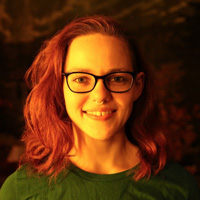
“The best experience in my PhD was when my first paper was cited because it gave me the feeling that my research brought significant information to the community. After teachers had doubted my abilities in natural science and lecturers criticised my ambitions to go into academia, holding the PhD certificate in my hands was a big win.
My PhD time helped me find out what I really want: No more talking, I combat the climate crisis! Luckily, my degree enables me to find science-based solutions which may have a measurable effect on atmospheric CO2 concentrations and global temperature.
The courses from Tress Academic helped me to shape my scientific profile and gain a valuable tool box of skills during and after the PhD. They also helped me to handle several crises and not lose confidence in myself during hard times.
If doing my PhD again, I would take more time to study and practice methodologies in related fields, and I would definitely be more confident in saying ‘no’.”
Currently, Maria-Elena works as a Postdoc at the Alfred-Wegener-Institute for Polar and Marine Research researching olivine-dissolution in high-energy marine environments as a possible carbon dioxide removal method. Contact her at maria-elena.vorrath@awi.de on Twitter, LinkedIn or ResearchGate. She’s engaged in the CDR Mare and Carbon Drawdown projects.

Success story #2:
Vasileios Pefanis (PhD), Climate Science
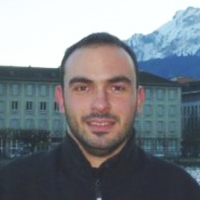
“I am Vasilis and I recently completed my PhD in Physical Oceanography. After graduation, I had the chance to enjoy a long holiday in my home country, Greece, and dispel all the stress from the last year. I believe that pursuing a PhD teaches you how to work in a structured way, overcome setbacks and foster your problem-solving skills. At the moment I’m looking forward to using this skill set to do meaningful work in a research-related role in the industry.
What helped me the most from the TRESS ACADEMIC courses I attended was the guidance on coping with the challenges of the PhD and efficiently managing my time. It was also very valuable to see that the challenges I was facing were very common among PhD candidates. My advice to other PhD students: If you’re experiencing a conflict with supervision, try to effectively deal with it as early as possible, otherwise the problem will remain. If there is no improvement, know that replacing your supervisor is an option.”
Currently, Vasilis is on a job hunt in the industry. You can find him on LinkedIn. Find out more about his research in this recent paper on Amplified Arctic Surface Warming and Sea Ice Loss Due to Phytoplankton and Colored Dissolved Material.
Success story #3:
Anu Susan Sam (PhD), Agricultural Economics
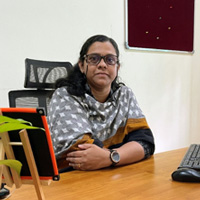
“The best experience from my PhD? My father was immensely proud and happy that his daughter was working towards a PhD. Unfortunately when I obtained my degree, he was not in this world anymore to see his daughter’s success. So I dedicated my PhD degree to my father. I know if my father would be with me now, he would be the happiest person to see my PhD degree.
Completing my PhD degree has brought many positive changes in my personal and professional life. I became a more organised and disciplined person. In 2015, I attended two courses of TRESS ACADEMIC: (1) Coping with the challenges of a PhD and (2) How to publish in peer-reviewed journals. Both courses helped me a lot, and I am very thankful to Bärbel and Gunther. The first course helped me to organize my whole PhD period efficiently, work accordingly, and successfully finish my PhD on time. The second course changed my writing style. It helped me write my articles in a very professional way. Since 2016, I have successfully published 7 papers in international peer-reviewed journals, and three are currently under review.
When looking back, I always feel that I should have had a proper work-life balance. The key to a healthy PhD is an effective work-life balance. It is very essential to have pauses and breaks during your PhD to avoid burnout. These breaks and pauses help you to enjoy what you do rather than seeing it as a liability.”
Currently, Anu works as Assistant Professor in Agricultural Economics, Regional Agricultural Research Station (Kumarakom), Kerala Agricultural University, Kerala, India. Contact her at anu.susan@kau.in or be in touch with her on LinkedIn or ResearchGate. Her latest paper is on flood vulnerability and food security in eastern India.

Success story #4:
Janosch Michaelis (PhD), Atmospheric Science
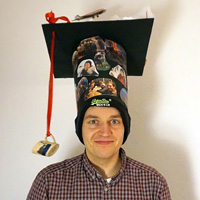
“I am very satisfied with my time as a PhD candidate. It started well since I quickly got into the research topic and experimented with the computer model that I used in the upcoming years. After six months, I attended Bärbel’s course on coping with the challenges of a PhD. One thing I remember from it was that the timeline you face during a PhD has lots of ups and downs. Sometimes things take a bit longer, and other things can go by quicker than you think. For me, the PhD process was not a straight horizontal line until the end. At a certain point, repeating the model experiments again and again was not really fun anymore. What helped me most when these rather frustrating times showed up was to talk about it with other people.
Moreover, I realised that postponing regularly reporting your PhD progress to your supervisor(s) or your thesis committee doesn’t make things better, and in fact worsens your situation. I know that there are some PhD candidates who seriously struggle building a good relationship with their supervisor(s)—fortunately, mine all supported me a lot—but having a regular exchange with the supervisor and talking about your PhD situation really can bring a positive change.
Two other things I’ve really enjoyed during my PhD time: the experiences I had during an expedition in the Arctic, and as a PhD representative at my institute. Both boosted my motivation. From a more technical point of view, Gunther’s publishing courses have also helped me a lot, especially with structuring the process of writing research articles.
Finally, I am just happy and thankful that I got the opportunity to pursue a PhD in the discipline I have been fascinated with for a long time. But for now, I am also really happy that I don’t wake up every morning to face the fact that there is a thesis that still needs to be written … :)”
Currently, Janosch works as a postdoctoral researcher on atmospheric processes in the polar regions. Find out more about his PhD thesis at or watch a German summary on YouTube. Contact him at janosch.michaelis@awi.de or on Twitter and ResearchGate.
Success story #5:
Jakob Belter (PhD), Sea Ice and Climate Physics
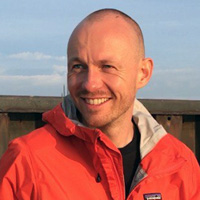
“Finishing my PhD meant a great deal to me. I had set the goal to finish it within the three years I had available, and achieving it was a great feeling. The next day, I definitely woke up with a smile on my face, but it took a while for it to really sink in.
I think the biggest change was that I proved to my colleagues that I could get stuff done when necessary. Yes, I could do it! My research is strongly based on field work, and finishing the PhD really opened the door for additional field work expeditions for me, and I was rewarded with more responsibility during those expeditions.
I know that the TRESS ACADEMIC courses provided me with a lot of knowledge and insight that I use daily without even realising it. But there are two things in particular that I remember: One is the ’to do list’ tool ToDoist, which was introduced in the PhD course ‘with Bärbel. I took the course during my first month as a PhD student and started using the tool right away. It helped me structure my work, and I also realised how achieving tasks (even small ones) motivates and pushes you (I still use it every day).
The second course that really helped me was ‘How to present at international conferences’. This course in particular highlighted how important it is to tailor presentations to the audience you are addressing so that people really engage with your work, and provide feedback and start discussions that help develop your project. Giving good presentations is a process, but this course really highlighted the key ingredients of a great presentation. It was a great feeling to present my work in my PhD defence and know that I nailed it!
What helped me most during my time as a PhD candidate was never forgetting what my goal was. There is always a lot of work, and much of it is unrelated to your own project. At some point, you have to start saying ’no’ to this other work and focus on what gets your PhD project to the finish line. I was lucky enough to have a great work environment, and colleagues that helped me stay on track. So I wouldn’t have done anything differently, but I highly recommend to others to keep the focus on YOUR project!”
Currently, Jakob works as PostDoc at the Sea ice Physics section of the Alfred Wegener Institute, Helmholtz Centre for Polar and Marine Research. Contact him at jakob.belter@awi.de.
Congratulations!
Big shout-out to Maria-Elena, Vasileios, Anu, Janosch, and Jakob (and many others)! You made it! The dream of waking up to a PhD project that is completed has come true. No more lonely weekends in the lab because an experiment has to be finished, no more sleepless nights because your supervisor doesn’t like your paper draft, and no more unnerving questions from friends and family as to when you’ll be finished with your degree! You’re done with the PhD! It’s over! And you’re the living embodiment of something that many PhD candidates find hard to imagine: there is a life after the PhD! It’s worth heading for! And it’s fun too! Go for it!
The Smart Academics Blog is here for you, and for all others with academic career goals. We love supporting you! As a special bonus for this 100th edition of the blog, we’ve created THE resource sheet f to help you navigate the Smart Academics Blog: The Ultimate Smart Academics Survival Kit! It shows you immediately where on the blog to find advice on publishing papers, planning your PhD, writing the dissertation, dealing with mental health issues, presenting your research, searching for an academic job, or how to become an efficient researcher. The Ultimate Smart Academics Survival Kit—free for you to download, so you don’t miss out on good advice. Enjoy!
P.S. Do you have a PhD or publishing success to share? Why don’t you write to us at info@tressacademic.com!
Relevant resource:
More information:
Do you want to successfully complete your PhD? If so, please sign up to receive our free guides.
Photograph from Maria-Elena Vorrath by David Hummel. Cover photo by Vinicius Wiesehofer on unsplash.com
© 2021 Tress Academic
